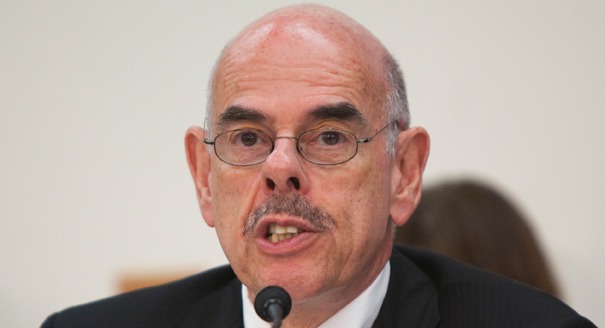More than two months after Freedom Industries spilled tens of thousands of gallons of 4-methylcyclohexane methanol into the Elk River, many West Virginians are still relying on bottled water. And state and federal officials lack complete information about the toxicity of the coal-treatment chemical that poisoned the tap water of 300,000 people downstream.
The law regulating chemical safety, passed while Gerald Ford was president, in fact “regulates” very little. To mention two glaring shortcomings: it doesn’t require chemical companies to prove their products are safe or to release information about toxicity.
There is a legislative fig leaf in the works. Senate Bill 1008, which purports to address chemical risks, is being quietly pushed through Congress by the chemical lobby and its well-paid representative, Republican Senator David Vitter of Louisiana.
The retiring California congressman is a monument to the quaint notion of “government for the people.”
As written, S.B. 1008 leaves in place the same enforcement mechanisms that exempted 4-methylcyclohexane methanol and 84,000 other potentially hazardous chemicals from testing by the EPA.
After the West Virginia ecological catastrophe, Congressman Henry Waxman—whose recently-announced retirement after four decades in the House is an incalculable loss—wrote to Freedom Industries and demanded information on the chemical the company spilled into the Elk River.
Waxman, in fact, was hard on this beat before the West Virginia disaster. At a December 31 House subcommittee hearing, he questioned Jim Jones, the EPA’s point man on chemical safety:
You testified that in the last 37 years, EPA has only been able to require testing on a little more than 200 of the more than 84,000 chemicals listed on the TSCA [Toxic Substances Control Act] inventory. That means that not even 1 percent of chemicals have been tested for safety in nearly four decades.
Jones said a fundamental flaw in the new Senate bill is the lack of measures the EPA can use to compel companies to prove chemicals are safe. Missing are hard deadlines like those written into the Food Quality Protection Act, a federal law that actually works. Using that law, Jones said:
We had to look at all pesticides used on food within 10 years, and during a 10-year period, we evaluated them all. Actually, 99 percent met the deadline.
Jones didn’t have to explain that law to Waxman. In 1996, the California congressman moved the Food Quality Protection Act through the House and on to Bill Clinton’s desk. The legislation, like Henry Waxman himself, is a monument to the quaint notion of “government for the people.”
The bill Vitter is pushing through the Senate has serious flaws. But barring the basic revisions Waxman is demanding, the legislation will do little to rein a powerful, deregulated industry that has quietly asserted its place as a primary public health hazard and a leading cause of environmental degradation in the U.S.
Lou Dubose is the editor of The Washington Spectator.







0 Comments